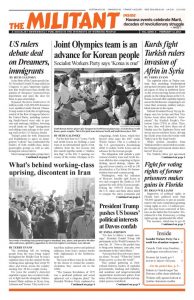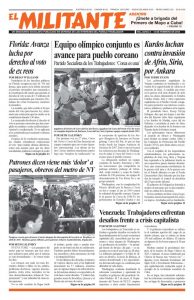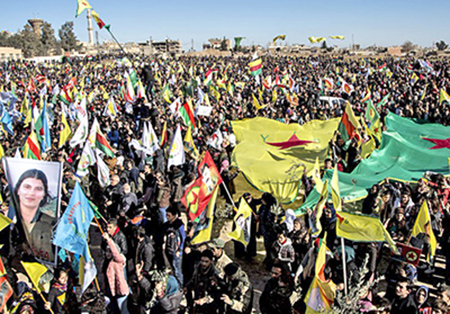The capitalist rulers in Turkey continue their punishing bombardment and ground invasion against the Kurdish region of Afrin in northwest Syria. As the seven-year-long Syrian civil war grinds on, the ruling classes in the U.S., Russia, Iran and other capitalist regimes across the Mideast are competing to advance their economic, military and political interests in the region.
Turkish President Recep Tayyip Erdogan says his troops and their Free Syrian Army allies intend to “exterminate” the Kurdish People’s Protection Units (YPG) in Afrin. Then, he says, they will drive them out of Manbij near the Euphrates River and sweep across northern Syria, driving the Kurds away from the border with Turkey up to the Iraqi border.
While civilian casualties from Turkish artillery and airstrikes mount, the Erdogan government claims there haven’t been any.
The Turkish rulers got agreement from Moscow and Washington to unleash their assault on Afrin and have so far made limited gains with the YPG resisting the attacks.
With the backing of the U.S. imperialist rulers, the capitalist rulers of Iran, Iraq, Syria and Turkey have repressed the Kurdish populations in their countries for decades. Their common goal is to keep them divided and deny them a homeland. But one unintended consequence of the Syrian civil war and the fight against the Islamic State is that the Kurdish-led Syrian Democratic Forces has taken control over 25 percent of the country. The Turkish rulers are determined to prevent this from inspiring the Kurds in Turkey.
Erdogan’s government said all opposition to the war against the Kurds in Syria will be crushed. It has detained over 300 people who posted social media notes questioning the invasion. Eight executives of the Turkish Medical Association — a union of some 80,000 doctors and medical workers — were arrested on charges of terrorism after the association issued a statement saying, “No to war; peace now.”
In fighting in Syria and Iraq, the Iranian rulers have made the greatest gains. Aided by Moscow’s bombers, Iranian troops, fighting alongside Hezbollah and other Shiite militia forces, have helped the Bashar al-Assad regime in Syria retake control of large parts of the country. Hezbollah in Lebanon was set up by Tehran’s Revolutionary Guard in 1982.
The U.S. rulers are determined to maintain a presence in Syria to work to block further gains by Tehran. Ankara’s threat to advance on Manbij poses the possibility of armed conflict between Washington’s troops and its NATO ally. The U.S. Central Command said Jan. 29 that it will not pull its forces out of the that area.
Fearing the reaction of working people at home, the U.S. rulers don’t want to send tens of thousands of additional troops into the area. They face limited options in deploying proxy forces there. Both the Barack Obama and Donald Trump administrations chose the Kurds as the best fighting force to work with. This has infuriated the regime in Ankara. So when Washington announced it intended to stay in Syria and continue to arm the Syrian Democratic Forces, the Turkish government launched its move into Afrin.
A “peace” conference organized by the Russian, Iranian and Turkish governments opened Jan. 29 in Sochi, Russia, while the Assad regime continued its bombing of Syria’s Idlib province. No Kurds were invited. The conference broke up with no progress, as most Syrian opposition groups boycotted it. The Russian hosts had lined the streets with the flag of the Assad government.
When the Syrians left, the Turkish delegation said they would represent the Syrian opposition.
Saudi rulers seek to challenge Tehran
The Saud family monarchy that runs the bourgeois Saudi Arabian government is the biggest foe of Tehran in the area, but it has been hamstrung by its social backwardness, dependence on oil revenue and Wahabi religious fundamentalism.
Saudi Crown Prince Mohammed bin Salman is now leading a push to rid the country of aspects of the tribal-based social and political relations that are an obstacle to capitalist “modernization.”
Beginning Nov. 4, Prince Mohammed organized the arrest of some 300 princes and tycoons, who became immensely wealthy by using their privileged positions to plunder the country, and interned them at the Ritz Carleton Hotel in downtown Riyadh. Most have been released after agreeing to hand over a hunk of their wealth to the government, which says it has raised some $106 billion so far to spend on advancing infrastructure, industrial manufacturing and modernizing and diversifying the country’s economic base. Those who failed to pony up have been sent to the notorious Al Ha’ir prison for further convincing.
Prince Mohammed also seeks to break any resistance to his course. One of those held, Khaled bin Talal, had opposed the government’s 2016 decision to curb the power of the religious police.
The regime is moving to allow more modern bourgeois social relations, eliminating some of the restrictions on women, including the right to drive and attend public events. For the first time in decades, unaccompanied women joined young men to attend a soccer match in Jeddah Jan 12. Movie theaters will reopen after a 35-year ban in March.


